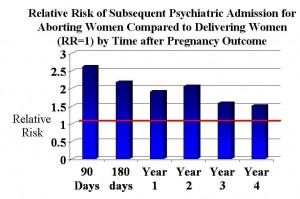Abortion History Linked to Bipolar Disorders — And the Ongoing Coverup
10/5/2015 | by David C. Reardon, Ph.D.
Women with a history of abortion are three times more likely to suffer from bipolar disorders, according to a new study published in the Journal of Affective Disorders.
The researchers’ findings were based on a comparison of reproductive histories of women treated for bipolar disorders with a control group of similar women without a history of bipolar disorders. They found that 42.4 percent of the women with bipolar disorders had a history of abortion compared to only 13.5 percent of the control group. There was no significant difference in pregnancy rates or use of contraceptives.1
 These findings are consistent with a 2003 record linkage study of 56,741 low income women in California that I conducted with my colleagues. In that study we found that the rate of first-time psychiatric admissions for bipolar disorders was three times higher after abortion compared to childbirth during the four years following the pregnancy.2
These findings are consistent with a 2003 record linkage study of 56,741 low income women in California that I conducted with my colleagues. In that study we found that the rate of first-time psychiatric admissions for bipolar disorders was three times higher after abortion compared to childbirth during the four years following the pregnancy.2
Unfortunately, additional research into the link between abortion and bipolar disorders is often obstructed by ideological considerations.
For example, a 2012 recent record linkage study of 120,378 Danish women examining risk of bipolar disorders following childbirth conspicuously excluded any analyses related to bipolar disorders following other pregnancy outcomes, specifically abortion or miscarriage, even though this data was available to the researchers.3 Indeed, when I pointed this omission out in a letter published by the journal and asked for publication of the results of bipolar disorders associated with abortion, the lead author, Trine Munk-Olsen, simply refused my request.
Burying the Truth
Why would she refuse?
There are only a few possibilities.
First, she may simply have no academic interest in abortion and mental health.
Or, second, she may desire to avoid any involvement in abortion and mental health research because of its controversial nature.
Or, third, she may know or suspect that complying with my request for additional analyses may undermine some belief which she values more than scientific objectivity.
While the first two options may apply to many academics, they don’t apply to Munk-Olsen.
Munk-Olsen’s bipolar disorders study actually uses the very same records she used for two highly publicized studies she had already published on abortion and mental health. In both studies, she asserted that a single first trimester abortion has few, if any, effects on subsequent mental health.4,5 (Methodological flaws in these studies are outlined at this link.)

So there is no lack of interest or fear to enter into this controversial area holding Munk-Olsen back.
In addition, Munk-Olsen has also cited my own studies in this field. Most specifically, she is familiar with our California studies that employed the same record linkage methods she used in her studies.
This means that given her proven interest in the abortion and mental health issue and her knowledge of the research of others, it is hard to imagine that Munk-Olsen did not think of running the analyses I had suggested long before she even published her study on bipolar disorders.
After all, she had all of the reproductive and mental health records compiled and ready at hand and the foreknowledge that others had already identified a link between abortion and bipolar disorders. Because all the data necessary was already linked and prepared, running an additional statistical analysis to identify rates of treatment for bipolar disorders after abortion would be a trivial effort . . . one measured in minutes, not hours, much less days or weeks.
It is so trivial, that even if Munk-Olsen legitimately did simply forget to consider exploring the association between abortion and bipolar disorders before she published her study, it would have been easy for her to do so after I made the request. Indeed, it is a common practice for researchers to respond to requests for additional analyses after publication of their initial results.
But instead of responding to my request with data that would either confirm or refute my prior findings, she rebuffed my request. Rather than take it as an opportunity to prove me wrong, she responded as if any further scientific inquiries are a waste of everyone’s time.
This avoidance behavior was repeated a year later when Munk-Olsen published a study comparing the use of antidepressants twelve months before childbirth and twelve months postpartum.6 In a letter to the editor published by the journal, I again pointed out that Munk-Olsen’s analysis was flawed by her failure to examine the effects of prior pregnancy losses (miscarriage or abortion) on antidepressant use before and after childbirth.
This omission, I noted, was especially significant since numerous studies had previously shown that a history of pregnancy losses increase the risk of psychological issues during and after subsequent pregnancies. In her response, Munk-Olsen refused to give any additional results and instead argued that her two previous studies on abortion and mental health had already proven that there are “no links between abortion procedures and increased risk of psychiatric episodes.”7
The File Drawer Problem and Publication Bias
The problem of researchers burying results that do not support their preferred hypotheses is often called the “file drawer problem.”
The decision of researchers to not publish some findings contributes to “publication bias,” which is actually relatively common.8 One study to investigate how common such research bias is examined 57 meta-analyses (studies that are themselves reviews of scores or hundreds of papers in a particular field). In this review of reviews, the investigators found that 41 percent of the meta-analyses identified evidence of such publication bias in their respective fields.9
So the problem is widespread. And clearly, the risk of publication bias is higher in fields where researchers have professional, personal, or cultural biases.
The pursuit of scientific truth is obviously hampered by self-censorship, when researchers voluntarily choose not to publish results. It is further set back when editors and reviewers choose to block publication of studies based on ideological concerns. But perhaps most concerning is when scientists refuse to undertake or allow reanalysis of their data when such concerns are raised.
This is one reason why many science organizations have ethical policies requiring data sharing. For example, the American Psychological Association’s code of conduct and ethical principles states that researchers “do not withhold the data on which their conclusions are based from other competent professionals who seek to verify the substantive claims through reanalysis” (section 8.14). Unfortunately, as reported previously, this policy has been ignored by the APA’s own task force leader on abortion and mental health, Brenda Major, who has refused to allow her own data on women receiving abortion to be subject to reanalysis.
The takeaway message is that evidence-based studies consistently show that abortion is associated with higher rates of psychological disorders.10 But studies using deceptive methodology can be constructed to minimize or ignore the effects associated with abortion. Moreover, even when additional analyses are requested or recommended, ideologically driven researchers are simply refusing to publish analyses that might undermine the claim that abortion has no mental health risks.
This ideology presents a threat to both academic integrity and to the health of women.
David C. Reardon, Ph.D., is the director of the Elliot Institute and the author of numerous peer reviewed medical studies on the aftereffects of abortion on women.
Published: June 5, 2015
References
1. Marengo E, Martino DJ, Igoa A, Scápola M, Fassi G, Baamonde MU, Strejilevich SA. Unplanned pregnancies and reproductive health among women with bipolar disorder. J Affect Disord. 2015 Jun 1;178:201-5.
2. Reardon DC, Cougle JR, Rue VM, Shuping MW, Coleman PK, Ney PG. Psychiatric admissions of low income women following abortion and childbirth. Can Med Assoc J. 2003; 168(10):1253-7
3. Munk-Olsen T, Laursen TM, Meltzer-Brody S, Mortensen PB, Jones I. Psychiatric disorders with postpartum onset: possible early manifestations of bipolar affective disorders. Arch Gen Psychiatry. 2012 Apr;69(4):428-34. doi: 10.1001/archgenpsychiatry.2011.157. Epub 2011 Dec 5.
4. Munk-Olsen, T, Laursen TM, Pedersen CB, Lidegaard Ø, Mortensen PB. Induced First-Trimester Abortion and Risk of Mental Disorder. N Engl J Med 2011;364:332-9.
5. Munk-Olsen T, Laursen TM, Pedersen CB, Lidegaard O, Mortensen PB. First-time first-trimester induced abortion and risk of readmission to a psychiatric hospital in women with a history of treated mental disorder. Arch Gen Psychiatry. 2012 Feb;69(2):159-65. doi: 10.1001/archgenpsychiatry.2011.153.
6. Munk-Olsen T, Gasse C, Laursen TM. Prevalence of antidepressant use and contacts with psychiatrists and psychologists in pregnant and postpartum women. Acta Psychiatr Scand. 2012 Apr;125(4):318-24.
7. Reardon DC. Lack of pregnancy loss history mars depression study. Acta Psychiatr Scand. 2012 Aug;126(2):155; author reply 155-6. doi: 10.1111/j.1600-0447.2012.01880.x.
8. Franco A, Malhotra N, Simonovits G. Publication bias in the social sciences: unlocking the file drawer. Science. 2014 Sep 19;345(6203):1502-5.
9. Ferguson CJ, Brannick MT. Publication bias in psychological science: prevalence, methods for identifying and controlling, and implications for the use of meta-analyses. Psychol Methods. 2012 Mar;17(1):120-8.
10. Coleman PK. Abortion and mental health: quantitative synthesis and analysis of research published 1995–2009. The British Journal of Psychiatry (2011) 199, 180–186.


Thank you for sharing this information.